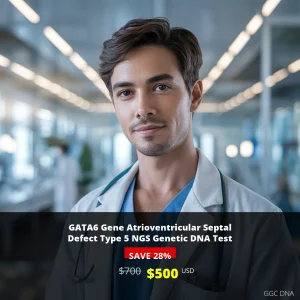DSG2 Gene Arrhythmogenic Right Ventricular Cardiomyopathy Type 10 NGS Genetic DNA Test
Understanding DSG2 Gene ARVC Type 10 Genetic Testing
Arrhythmogenic Right Ventricular Cardiomyopathy (ARVC) Type 10 is a serious inherited heart condition characterized by the progressive replacement of heart muscle with fatty and fibrous tissue, primarily affecting the right ventricle. The DSG2 gene plays a critical role in maintaining the structural integrity of cardiac muscle cells through desmosomal proteins. When mutations occur in the DSG2 gene, it disrupts the normal cell-to-cell connections in the heart, leading to the development of ARVC Type 10.
This advanced genetic test represents a breakthrough in cardiovascular genetic medicine, providing individuals and families with crucial information about their genetic predisposition to this potentially life-threatening condition. Early detection through genetic testing can significantly impact treatment outcomes and preventive strategies.
What Does the DSG2 Gene ARVC Test Detect?
Our comprehensive NGS genetic test specifically targets the DSG2 gene to identify pathogenic variants associated with ARVC Type 10. The test examines:
- Point mutations in the DSG2 gene coding regions
- Insertion and deletion variants affecting desmosomal protein function
- Missense, nonsense, and frameshift mutations
- Splice site variants that may alter gene expression
- Copy number variations affecting DSG2 gene dosage
The test utilizes state-of-the-art Next-Generation Sequencing technology, providing unparalleled accuracy in detecting even rare genetic variants that conventional methods might miss.
Who Should Consider DSG2 Genetic Testing?
Clinical Indications and Symptoms
This genetic test is particularly important for individuals experiencing:
- Unexplained palpitations or irregular heartbeats
- Recurrent syncope (fainting spells) without clear cause
- Abnormal ECG findings suggestive of right ventricular involvement
- Family history of sudden cardiac death, especially in young individuals
- Diagnosed ARVC in first-degree relatives
- Unexplained ventricular tachycardia originating from the right ventricle
- Structural abnormalities of the right ventricle detected on imaging studies
High-Risk Populations
- Individuals with confirmed ARVC diagnosis seeking genetic confirmation
- First-degree relatives of ARVC patients
- Young athletes with cardiac symptoms or family history
- Patients with unexplained right ventricular dysfunction
Benefits of DSG2 Genetic Testing
Undergoing DSG2 genetic testing provides numerous clinical advantages:
- Early Risk Identification: Detect genetic predisposition before symptoms develop
- Personalized Treatment Planning: Guide medication choices and intervention timing
- Family Screening: Identify at-risk relatives for preventive monitoring
- Sports Participation Guidance: Inform safe athletic activity recommendations
- Reproductive Planning: Provide information for family planning decisions
- Psychological Relief: Reduce uncertainty through definitive genetic information
Understanding Your Test Results
Possible Result Interpretations
Your DSG2 genetic test results will fall into one of several categories:
Positive Result
A positive result indicates the presence of a pathogenic DSG2 gene mutation associated with ARVC Type 10. This finding confirms genetic predisposition and necessitates:
- Regular cardiac monitoring and follow-up
- Possible medication therapy (beta-blockers, antiarrhythmics)
- Lifestyle modifications and activity restrictions
- Family member screening
- Consideration of implantable cardioverter-defibrillator (ICD) in high-risk cases
Negative Result
A negative result suggests no detectable DSG2 mutation was found. However, this doesn’t completely rule out ARVC risk, as other genetic or environmental factors may contribute. Continued clinical monitoring may still be recommended based on family history and symptoms.
Variant of Uncertain Significance (VUS)
Some genetic changes have unclear clinical implications. In these cases, ongoing research and family studies may help clarify the significance over time.
Test Pricing and Availability
| Price Type | Amount (USD) |
|---|---|
| Discount Price | $500 |
| Regular Price | $700 |
Test Specifications
- Turnaround Time: 3 to 4 Weeks
- Sample Type: Blood, Extracted DNA, or One Drop Blood on FTA Card
- Methodology: Next-Generation Sequencing (NGS) Technology
- Specialty: Cardiology and Genetics
- Disease Category: Cardiovascular Disorders
Pre-Test Requirements
Before undergoing DSG2 genetic testing, we recommend:
- Comprehensive clinical history documentation
- Genetic counseling session to discuss implications and expectations
- Development of detailed family pedigree chart
- Review of potential psychological impacts
- Discussion of insurance coverage and privacy considerations
Nationwide Testing Availability
We proudly offer DSG2 genetic testing services across the United States, with convenient locations in all major metropolitan areas including New York, Los Angeles, Chicago, Houston, Phoenix, Philadelphia, San Antonio, San Diego, Dallas, San Jose, and many more. Our network of certified genetic counselors and cardiovascular specialists ensures you receive comprehensive care regardless of your location.
Take Action for Your Heart Health
Don’t wait to address potential genetic heart conditions. Early detection through DSG2 genetic testing can be life-saving. Our team of cardiovascular genetic specialists is ready to guide you through the testing process and provide personalized recommendations based on your results.
Call us today at +1(267) 388-9828 to schedule your genetic counseling session and DSG2 testing appointment. Take the first step toward understanding your genetic heart health and protecting your future.
Our compassionate healthcare professionals understand the emotional aspects of genetic testing and are committed to providing supportive, confidential care throughout your journey. Contact us now to learn more about how DSG2 genetic testing can benefit you and your family.







